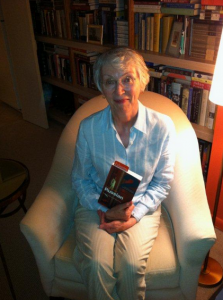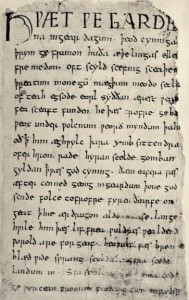G-Blogodaria
If I say Italy, what is the first word that comes to your mind?
Meet Nadia: Russian TA
 How has studying at the GLN benefited you?(personal or professional growth, networking, etc.)
I took two semesters of Russian because my domestic Russian had been in storage for many years and needed to be "freshened" it...
How has studying at the GLN benefited you?(personal or professional growth, networking, etc.)
I took two semesters of Russian because my domestic Russian had been in storage for many years and needed to be "freshened" it...
Meet Daniela: Showing Her Students the “Real Italiani”
Daniela is one of the volunteer teachers who does more than just teach the language, she immerses her students in Italian culture:
“Buongiorno! My name is Daniela Enriquez and, despite my Spanish last name, I am Italian. Since 2011, I have been involved with GLN as a teacher of beginner level Italian. My first teaching experience was in 2009. At that time, I was studying Hebrew in Jerusalem and decided to take part in a language exchange program through which I taught Italian to an Israeli girl who was teaching me Hebrew. The experience was so fulfilling that when I came to D.C. and heard about GLN, I decided immediately that I had to get involved.
My goal is to show my students that even thought Italy has great food, wine, and soccer players—Italian culture includes much more than that. I love to teach the history of my language, how it developed from Latin and ended up with hundreds of different dialects, and how it is strongly connected to the essence of Italian culture—expressing itself through songs, dances, ceremonies and gestures. In order to fulfill my goal, I try to involve my students in the many Italian cultural activities that D.C. offers so that they meet “real Italiani” and have opportunities to test out their new language skills.
GLN gave me the opportunity to teach my language in the way that I love—through culture and fun!—by supporting me with new innovative ideas and its great team. During my classes we enjoyed singing, dancing, learning about art, Italian holidays & gestures accompanied by dialogues, a little bit of grammar and a lot of vocabulary and common expressions—all according to the GLN philosophy. Over the course of these classes, I saw the progress of my students and was proud of them. In the meantime, I was positioned to see my own culture from a different point of view, through my students eyes, and—why not?—love it more than before, all while forming new long-term friendships.”
Meet Connie: An Interview with GLN’s Intern Extraordinaire

Connie Hyder, GLN Intern Extraordinaire.
Why did you choose GLN for an internship?
I went to a college where students spend 3 1/2 of their 4 years abroad, and in my travels I discovered a real passion for language and linguistic anthropology. As a recent grad, I was looking for a way to continue to work with languages without having to go into the teaching or translation, and so I found GLN. GLN’s vision to connect and empower people through language and culture, thereby promoting an understanding of linguistic and cultural diversity and aiming to form connections across those divides, really appealed to me, along with the fact that GLN is the only language school I know of that consistently offers classes in less-commonly-taught languages.
What did you learn from the internship?
I learned a lot about the administrative side of language education, as previously I’d only been familiar with how the teaching side works. It’s been inspiring to see the passion and energy devoted to promoting the mission and vision of the organization, whether it’s through outreach or program evaluations or even figuring out the classes each semester. That’s probably been my favorite part of my experience at GLN–working with the people involved in keeping this organization running. Since GLN is essentially volunteer-run, it’s especially admirable to find so many people who are enthusiastic enough about GLN’s cause to devote a great deal of their free time to keeping it running. For example, whenever I discuss GLN with people outside of the organization they’re always struck by the fact that all of the teachers are volunteers. I think it really says a lot about the people who work here that a teacher’s main reason to teach is purely their passion for their own language and culture.
What’s in store for your future?
This fall I’ll be beginning a library/information science internship with the Smithsonian Center for Folklife and Cultural Heritage and helping them out with their One World, Many Voices: Endangered Languages and Cultural Heritage project. I also plan on applying to grad school in fall for a Master’s in Library and Information Science. That might seem kind of odd given the amount of energy and time I’ve devoted to language study, but honestly it’s driven by exactly that. I’m considering pursuing the Archives/Records Management concentration because, through my experiences at school and at GLN, I’ve come to understand the importance of linguistic and cultural diversity and, in today’s rapidly globalizing world, the importance of preservation as a method of promoting and honoring a group’s heritage.
Is there anything else you’d like to share?
Interning at GLN is a great experience, especially for those interested in language or international education, and it gives you the chance to work with a fantastic group of people!
I truly enjoyed my time at GLN, and I hope to see you all at G-Fest in September!
Interested in an internship at the GLN? Click here for more information.
By Dint of Phrases: 12 Old Words That Survived Through Idioms
Arika Okrent talks about 12 English words that are only still in use due to idioms in this recent post for Mental Floss. The full list of words, most (if not all) of either Old English or Old French origin, includes “eke,” “deserts,” “sleight,” “wend,” “dint,” “roughshod,” “fro,” “hue,” “kith,” “lurch,” “umbrage,” and “shrift.” With respect to “sleight,” which is only used through the idiom “sleight of hand,” Okrent writes:
“‘Sleight of hand’ is one tricky phrase. ‘Sleight” is often miswritten as ‘slight’ and for good reason. Not only does the expression convey an image of light, nimble fingers, which fits well with the smallness implied by ‘slight,’ but an alternate expression for the concept is ‘legerdemain,’ from the French léger de main,” literally, ‘light of hand.’ ‘Sleight’ comes from a different source, a Middle English word meaning ‘cunning” or ‘trickery.’ It’s a wily little word that lives up to its name.”
If you are taking a course with GLN, do you know of any words in the language you are studying that are primarily used in idioms? Do you know of any English words that could be included Okrent’s list?

